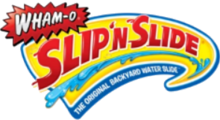 | |
| Type | Slide |
|---|---|
| Inventor(s) | Robert Carrier |
| Company | Wham-O |
| Country | United States |
| Availability | 1961–current |
| Official website | |

Slip 'N Slide is a children's toy invented by Robert Carrier and manufactured by Wham-O. It was first sold in 1961. The main form is a plastic sheet and a method of wetting it; when the surface is wet it becomes very slippery, thus allowing the user to slide along it. Some versions also include an inflatable swimming pool for the user to slide into at the end of slide, and spray tubes.
History
The creator was inspired by his son sliding on wet, painted concrete. He used his job as an upholsterer to obtain a long strip of Naugahyde, sewed a tube to pass a hose into, and punctured the tube sporadically to allow water to spurt out. Carrier sold his invention to Wham-O where they replaced Naugahyde with plastic to reduce production costs. The toy is a long sheet of thin plastic, constructed with a heat-sealed tube running along one side. The tube can be connected to any garden hose and water goes in the tube and out through small holes, spraying onto the sliding surface where it becomes very slippery, allowing users to slide the length of the sheet and also has lubricant molded into the plastic that acts as a propellant. 30 million slides were sold in 2011.
Beyond 2001, Wham-O and makers of similar competitive products later included various enhancements such as an inflatable pool at one end of the sliding surface, spray tubes on both sides and longer paths.
Safety
The Consumer Product Safety Commission (CPSC) and the manufacturer recommend that the use of the toy is only for children to avoid back and neck injuries when it is used by adults and teenagers. People older than children might stop suddenly when diving onto the toy due to their weight or height. Between 1973 and 1991, a 13-year-old and seven adults suffered neck injuries or paralysis while using Slip 'N Slides.
In 1993, CPSC provided a recall notice along with Kransco, which owned Wham-O at the time, to warn users of the dangers; the product was not taken off the market completely but was recommended only for children.
References
- Sexton, Courtney (2 July 2020). "The Accidental Invention of the Slip 'N Slide". Smithsonian. Retrieved 13 July 2020.
- "Iconic Slip'N Slide® Makes a Big Splash on its 50th Birthday" (Press release). Woodland Hills, California: Wham-O, Inc. 26 April 2011. Archived from the original on 18 January 2014. Retrieved 2020-05-17.
- Hiebert, Paul. "50 Years Later, The Slip'N Slide Is Still Simple, Speedy Fun (For The Brave) - Wham-O". Wham-o.com. TheDaily.com. Archived from the original on 18 May 2020. Retrieved 18 May 2020.
- ^ "A Hazardous History of the Slip 'N Slide". www.mentalfloss.com. 2019-08-09. Retrieved 2021-04-05.
- "Slip 'N Slide®". Wham-O. Retrieved 2021-04-04.
- "WHAM-O Backyard Water Slides Are Dangerous For Adults And Teenagers - CPSC.gov". CPSC.gov. U.S. Consumer Product Safety Commission. 27 May 1993. Archived from the original on 4 March 2016.
CPSC and Kransco urge adults and teenagers NOT to use the WHAM-O backyard slides. Consumers should read the warnings and instructions on the box and on the toy itself which state that the product is NOT intended for adult use. Adults should instruct children how to use the slides safely.